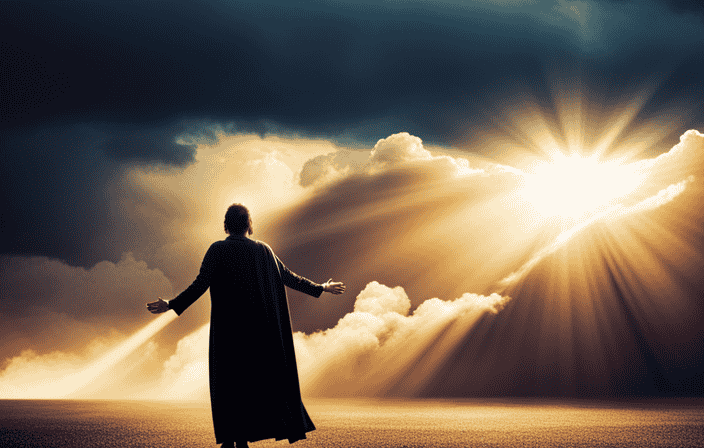Do you feel disconnected from your higher being? Are you having trouble achieving inner serenity and realizing your spiritual capabilities? You might be going through what is often referred to as a ‘spiritual death.’
In this article, we will delve into the causes of this loss of connection, including personal sin, neglect of spiritual practices, and rejection of grace. We will explore the consequences and impact of spiritual death, as well as ways to overcome and heal.
Join me as we understand the importance of spiritual practices and the role of guidance and support in staying spiritually alive.
Key Takeaways
- Spiritual death can occur regardless of religious background, highlighting the importance of nurturing one’s spiritual well-being through self-reflection and positive beliefs.
- Potential conflicts caused by religious affiliation can lead to divisions and lack of unity, empathy, and understanding, resulting in a loss of connection.
- Exploring spirituality can lead to a deeper sense of purpose and inner peace, as well as a connection to something greater than ourselves.
- Self-reflection and mindfulness play crucial roles in nurturing spirituality, as they foster personal growth, self-discovery, and a deeper connection to oneself and others.
Definition of Spiritual Death
I believe that spiritual death is the state of being disconnected from a higher power and lacking a sense of purpose in life. It is a profound loss of connection that can leave us feeling empty and lost.
When we neglect our spiritual practices, reject the grace and guidance offered to us, and succumb to negative thinking patterns or habitual sin, we are at risk of experiencing this spiritual death. We may feel a deep void within us, unable to find inner peace or fulfill our spiritual potential. This disconnection can also have a negative impact on our mental health and make it difficult for us to form positive relationships.
Overcoming spiritual death requires seeking guidance and support from spiritual leaders, practicing mindfulness and self-reflection, and embracing positive beliefs and values. Through these actions, we can nourish our souls and regain that vital connection to a higher power.
Causes and Factors
Exploring the factors that contribute to a lack of spiritual vitality involves understanding the various influences and circumstances that contribute to this state. There are multiple causes and factors that can lead to spiritual death, resulting in a loss of connection to a higher power and a sense of purpose in life. Personal sin, neglect of spiritual practices, and rejection of grace are common causes. Additionally, habitual sin, negative thinking patterns, and traumatic experiences can also contribute to this state.
To provide a visual representation of these causes, here is a table outlining some of the factors that can contribute to spiritual death:
| Causes and Factors |
|---|
| Personal sin |
| Neglect of spiritual practices |
| Rejection of grace |
| Habitual sin |
| Negative thinking patterns |
| Lack of purpose in life |
| Traumatic experiences |
Understanding these causes and factors allows individuals to recognize and address the areas in their lives that may be contributing to their spiritual death. By seeking guidance, practicing mindfulness, and embracing positive beliefs and values, one can begin to overcome spiritual death and reconnect with their spiritual potential.
Consequences and Impact
Consequences and Impact of spiritual death can leave us feeling like ships adrift on a vast and lonely sea, without an anchor to ground us and guide us towards inner peace and fulfillment. The loss of connection to our spiritual selves has profound effects on our lives, affecting various aspects of our well-being.
Here are four consequences and impacts of spiritual death:
-
Feeling disconnected and lost: Without a spiritual connection, we may feel a deep sense of emptiness and purposelessness, leading to a lack of direction in life.
-
Struggling to find inner peace: Spiritual death robs us of the ability to find solace and tranquility within ourselves, leaving us restless and constantly searching for something to fill the void.
-
Inability to fulfill spiritual potential: When disconnected from our spirituality, we miss out on the opportunity to grow and develop spiritually, inhibiting our ability to reach our highest potential.
-
Difficulty forming positive relationships: Our spiritual death can negatively impact our relationships, making it challenging to connect with others on a deeper level and experience genuine intimacy and connection.
It is essential to recognize and address the consequences and impact of spiritual death in order to embark on a journey of healing and restoration.
Overcoming and Healing
Seeking guidance and support from spiritual leaders is crucial in overcoming and healing from spiritual death. These individuals have a deep understanding of the spiritual journey and can provide invaluable wisdom and guidance.
They can help us navigate through the darkness and find the light again. Through their teachings and insights, they can help us uncover the root causes of our spiritual death and provide practical steps to overcome them.
By offering a listening ear and a compassionate heart, they create a safe space for us to share our struggles and fears. They remind us of our inherent worth and the love and grace that is available to us.
With their support, we can begin the process of healing, reconnecting with our spiritual essence, and rediscovering our purpose in life.
Importance of Spiritual Practices
Practicing mindfulness and self-reflection helps me stay spiritually alive and connected to my higher power.
In this fast-paced world, it’s easy to get caught up in the chaos and lose sight of our spiritual nature. However, by taking the time to be present and reflect on our thoughts and actions, we can cultivate a deeper connection with our higher power.
Mindfulness allows me to be aware of my emotions and thoughts, helping me identify any negative patterns that may hinder my spiritual growth. Self-reflection helps me understand my strengths and weaknesses, enabling me to make positive changes and align myself with my higher power’s will.
By actively engaging in these practices, I am reminded of the importance of my spirituality and am able to nurture that connection, finding peace and fulfillment in my journey.
Role of Guidance and Support
With the help of guidance and support, I am able to navigate the challenges of maintaining my spiritual connection. These invaluable resources have provided me with the tools and encouragement necessary to overcome obstacles and stay connected to my higher power.
Here are five important ways in which guidance and support have played a crucial role in my spiritual journey:
- Offering wisdom and insight: Spiritual leaders and mentors have shared their knowledge and experiences, helping me gain a deeper understanding of my spiritual path.
- Providing encouragement and motivation: During times of doubt or struggle, the guidance and support I receive remind me of the importance of staying connected and encourage me to persevere.
- Offering accountability: Having someone to hold me accountable for my actions and choices ensures that I remain focused on nurturing my spiritual connection.
- Offering a safe space for exploration: The guidance and support I receive provide a non-judgmental and accepting environment where I can freely explore my beliefs and doubts.
- Providing a sense of community: Being part of a larger spiritual community offers a sense of belonging and support, reminding me that I am not alone on my journey.
With the help of guidance and support, I am able to navigate the challenges of maintaining my spiritual connection, and I am grateful for the wisdom, encouragement, accountability, safe space, and sense of community they provide.
Impact of Traumatic Experiences
While seeking guidance and support from spiritual leaders is crucial in overcoming spiritual death, it is important to recognize the significant impact that traumatic experiences can have on our spiritual well-being.
Trauma can shake the very foundation of our beliefs and connection to a higher power. It can leave us feeling lost, questioning our faith, and struggling to find meaning in our lives. The pain and suffering caused by traumatic events can create a barrier between us and our spiritual selves, hindering our ability to heal and grow.
However, it is possible to navigate through these dark moments and find a path towards spiritual renewal. By acknowledging the impact of trauma and actively seeking healing and support, we can begin to rebuild our connection and rediscover the resilience of our spiritual selves.
Understanding Beyond Religion
Discovering the depth of my spirituality has allowed me to embrace a broader understanding of the human experience, transcending the confines of religious affiliation. It has shown me that spirituality is not limited to specific beliefs or practices, but rather a personal journey of connection to something greater than ourselves. While religious traditions can provide guidance and a sense of community, spirituality goes beyond these boundaries, encompassing a universal quest for meaning, purpose, and connection. It is about exploring our inner selves, cultivating mindfulness, and embracing values that promote love, compassion, and respect for all beings.
To illustrate this concept, let me present a table that highlights the key differences between religious affiliation and spirituality:
| Religious Affiliation | Spirituality |
|---|---|
| Focuses on specific beliefs, rituals, and practices | Emphasizes personal connection and inner exploration |
| Provides a structured community and set of rules | Encourages individual growth and self-discovery |
| Prescribed by external authorities | Nurtured through personal experiences and self-reflection |
| Can create divisions and conflicts | Promotes unity, empathy, and understanding |
| Offers a sense of identity and belonging | Transcends labels and embraces universal interconnectedness |
Understanding spirituality beyond religious affiliation allows us to see that the loss of connection, or spiritual death, can occur regardless of one’s religious background. It emphasizes the importance of nurturing our spiritual well-being through self-reflection, mindfulness, and the cultivation of positive beliefs and values. By exploring our own spirituality, we can find a deeper sense of purpose, inner peace, and connection to something greater than ourselves.
Frequently Asked Questions
How can traumatic experiences contribute to spiritual death?
Traumatic experiences can contribute to spiritual death by causing feelings of disconnection and loss. They can shatter one’s faith, create negative thinking patterns, and make it difficult to find inner peace. Seeking support and healing is crucial in overcoming this spiritual death.
Are there any statistics on religious affiliation and its impact on spiritual death?
According to a recent study, religious affiliation plays a significant role in reducing the risk of spiritual death. Individuals who actively participate in a religious community are more likely to maintain a strong spiritual connection and avoid spiritual death.
Can spiritual death be reversed or healed?
Yes, spiritual death can be reversed or healed. By seeking guidance, practicing mindfulness, nurturing a relationship with a higher power, and embracing positive beliefs, individuals can reconnect with their spirituality and find inner peace.
What role does self-reflection play in overcoming spiritual death?
Self-reflection is crucial in overcoming spiritual death. It allows us to examine our beliefs, actions, and values, helping us reconnect with our higher power. Through self-reflection, we can identify areas for growth and make positive changes in our lives.
How does lack of purpose in life contribute to spiritual death?
Lack of purpose in life contributes to spiritual death by creating a sense of emptiness and disconnection. Without a clear sense of meaning, one may feel lost and struggle to find fulfillment in their spiritual journey.
Conclusion
In conclusion, the loss of connection to a higher power, known as spiritual death, can have profound consequences on our well-being and relationships. It is a result of personal sin, neglect of spiritual practices, or rejection of grace.
However, we have the power to overcome this spiritual death by seeking guidance, practicing mindfulness, and embracing positive beliefs and values. By nourishing our souls through spiritual practices and finding support in a community, we can rise above the darkness and find the light of healing and connection once again.
Remember, even in the depths of despair, there is always hope for a spiritual rebirth.









